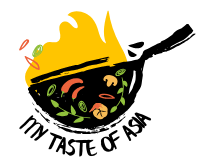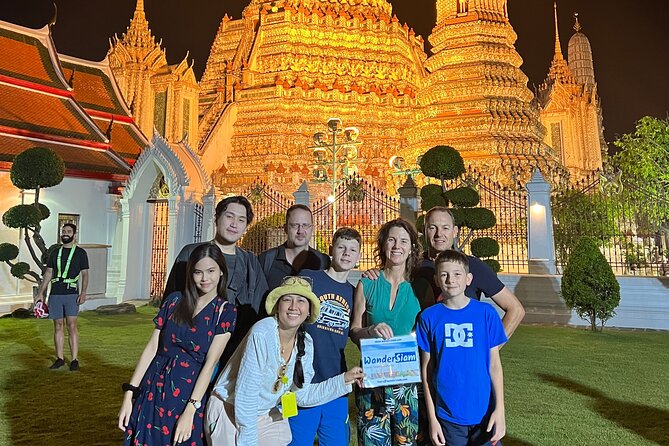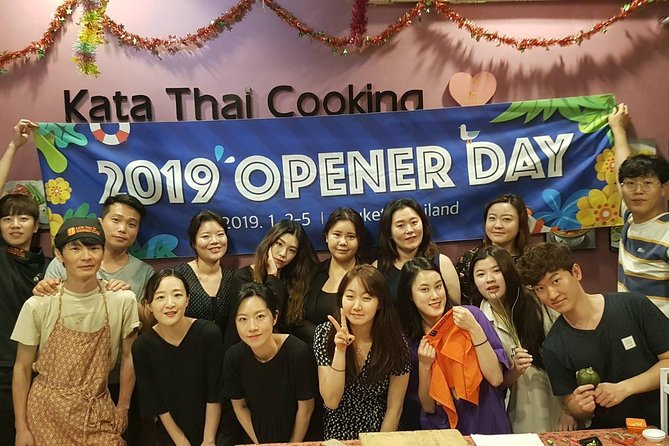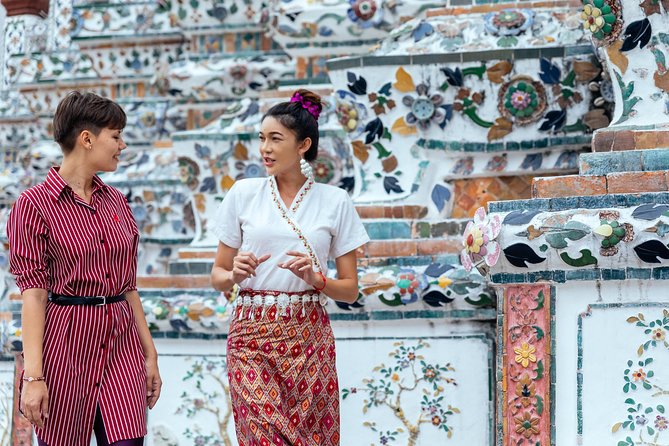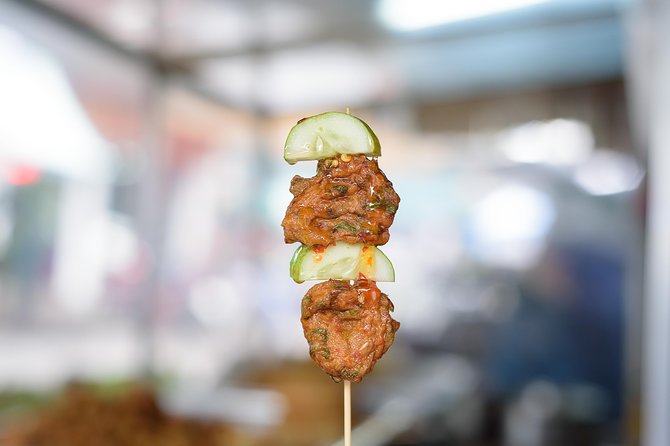The Hanoi Egg Coffee Making Course offers a unique culinary experience where participants can learn the art of making this traditional Vietnamese beverage. Operated by Hoang’s Cooking Class, the course ensures an intimate and personalized learning experience with a maximum of 14 travelers.
With a focus on third-person point of view and active voice, this article explores the details of what to expect from the course, including accessibility, confirmation procedures, and cancellation policies.
Whether a coffee lover or simply curious about Vietnamese culture, this course promises an immersive and educational adventure in the heart of Hanoi.
Key Takeaways

- The Hanoi Egg Coffee Making Course is offered by some coffee shops in Hanoi.
- Participants can learn the process, ingredients, and techniques of making egg coffee from experts.
- The course provides a hands-on experience in creating their own cup of egg coffee.
- Upon completion of the course, participants receive a certificate.
The History of Egg Coffee in Hanoi

The history of egg coffee in Hanoi dates back to the 1940s when Nguyen Giang, the founder of Cafe Giang, came up with the idea of combining beaten egg yolks with coffee to create a unique and creamy beverage.
During this time, Vietnam was experiencing a shortage of milk due to the French colonization. As a result, Nguyen Giang had to find an alternative way to make his coffee taste creamy and delicious. He experimented with different ingredients and eventually discovered that by whisking egg yolks with sugar and coffee, a frothy and velvety texture could be achieved.
This innovative recipe quickly gained popularity, and egg coffee became a beloved drink in Hanoi. Today, Cafe Giang is still serving their famous egg coffee, and it has become a must-try beverage for both locals and travelers visiting Hanoi.
Traditional Ingredients and Equipment for Egg Coffee
He uses a whisk and a small pot to heat the water and coffee mixture before adding the beaten eggs and sugar to make traditional egg coffee. The process of making egg coffee requires specific ingredients and equipment. The table below highlights the traditional ingredients and equipment used in making this unique Vietnamese beverage.
| Ingredients | Equipment | Technique |
|---|---|---|
| Robusta coffee | Whisk | Heating |
| Eggs | Small pot | Mixing |
| Sugar | Beating |
Robusta coffee is the preferred choice for making egg coffee due to its strong flavor and high caffeine content. The whisk is used to froth the eggs and sugar, creating a creamy texture. A small pot is used to heat the water and coffee mixture before adding the beaten eggs and sugar. The technique involves combining the ingredients in the right proportions and stirring them vigorously to create the perfect blend. With these traditional ingredients and equipment, one can enjoy a delicious cup of Hanoi’s famous egg coffee.
Step-by-Step Guide to Brewing the Perfect Cup of Egg Coffee
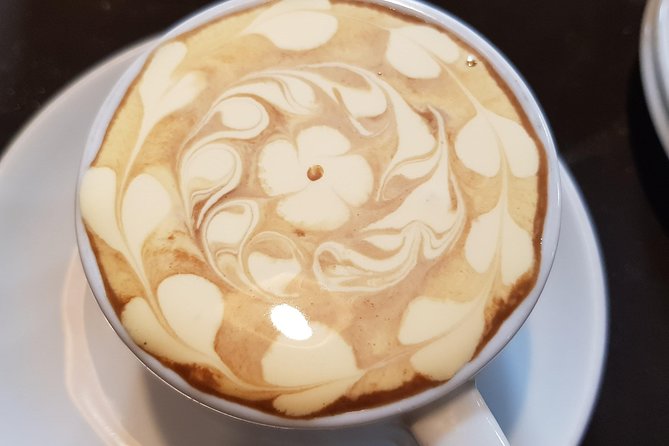
She carefully follows the step-by-step guide and combines the right proportions of coffee, eggs, and sugar to brew the perfect cup of egg coffee.
-
First, she takes a small saucepan and adds water to it. She brings the water to a boil over medium heat.
-
While the water is heating up, she cracks open an egg and separates the yolk from the white. She sets aside the yolk for later use.
-
Once the water is boiling, she adds ground coffee to a metal filter and places it on top of the saucepan. She pours the boiling water over the coffee grounds, allowing it to drip into the saucepan below.
-
Next, she takes the reserved egg yolk and beats it with sugar until it becomes thick and frothy. She then adds a small amount of the brewed coffee to the egg mixture, stirring it well to combine.
-
Finally, she pours the remaining brewed coffee into a cup and carefully adds the egg mixture on top. She gives it a gentle stir to incorporate the flavors and enjoys her perfectly brewed cup of egg coffee.
Variations and Flavors of Hanoi Egg Coffee
.jpg)
Interestingly, there are various flavors and delicious variations of Hanoi Egg Coffee to satisfy different tastes and preferences. Hanoi Egg Coffee, a unique Vietnamese beverage, is made by beating egg yolks with condensed milk and coffee to create a creamy and frothy concoction. While the traditional recipe is a favorite among locals and travelers alike, there are exciting twists to this classic drink that offer a new sensory experience. Here are some popular variations of Hanoi Egg Coffee:
| Flavors | Description |
|---|---|
| Coconut | Adds a subtle tropical twist with the creamy and aromatic flavor of coconut |
| Chocolate | Infuses the beverage with rich and indulgent chocolate notes |
| Matcha | Combines the earthy and grassy flavors of matcha green tea |
These variations add depth and complexity to the already delightful Hanoi Egg Coffee, making it a must-try for coffee enthusiasts seeking new and exciting flavors.
Tips and Tricks for Mastering the Art of Egg Coffee Making
.jpg)
To truly master the art of egg coffee making, one must carefully and frequently practice the tips and tricks provided.
-
Find the perfect balance of sweetness: Egg coffee is known for its unique combination of rich coffee flavor and creamy sweetness. Experiment with different ratios of coffee, condensed milk, and sugar to achieve the desired level of sweetness.
-
Whip the egg mixture to perfection: The key to achieving the signature frothy texture of egg coffee lies in properly whisking the egg yolks and condensed milk. Use a hand whisk or a blender to create a creamy and fluffy mixture.
-
Brew the coffee with precision: The quality of the coffee used in egg coffee is crucial. Opt for a medium to dark roast with a strong flavor profile. Brew the coffee using a French press or a traditional Vietnamese coffee filter for a robust and aromatic cup.
-
Serve in a traditional Vietnamese coffee cup: To fully appreciate the art of egg coffee making, serve the beverage in a small, clear glass cup. This allows you to admire the layers of coffee and egg mixture, creating a visually pleasing experience.
Exploring the Cultural Significance of Egg Coffee in Hanoi
.jpg)
Although it may seem like a simple beverage, egg coffee in Hanoi holds a deep cultural significance. This unique drink is a beloved part of Vietnamese culture and has been enjoyed by locals for generations.
The origins of egg coffee can be traced back to the 1940s, when milk was scarce in Vietnam and a resourceful bartender named Nguyen Van Giang decided to use egg yolks as a substitute. The result was a creamy, rich, and slightly sweet concoction that quickly became a hit.
Today, egg coffee isn’t just a popular drink, but also a symbol of Hanoi’s culinary heritage. It’s often served in traditional coffee shops known as ‘ca phe trung,’ where visitors can experience the authentic taste and ambience of this cultural icon.
Where to Find the Best Egg Coffee Shops in Hanoi
Visitors can discover the best egg coffee shops in Hanoi by asking locals or doing online research.
Here are four top recommendations for egg coffee shops in Hanoi:
-
Giang Café: Established in 1946, Giang Café is the birthplace of egg coffee in Hanoi. The creamy and velvety texture of their egg coffee is unmatched, making it a must-try for any coffee lover.
-
Cafe Pho Co: Located in a hidden alley near Hoan Kiem Lake, Cafe Pho Co offers a unique experience. Visitors can enjoy their egg coffee while overlooking a stunning view of the city from the rooftop terrace.
-
Cafe Dinh: Tucked away in a small alley, Cafe Dinh is known for its cozy and nostalgic ambiance. Their egg coffee is served with a generous dollop of frothy egg foam, creating a delightful combination of flavors.
-
Nang Cafe: This charming cafe is famous for its creative twists on classic egg coffee. From flavors like coconut and chocolate to matcha and salted caramel, Nang Cafe offers a wide variety of options to satisfy different tastes.
Whether it’s the traditional taste or innovative flavors you seek, these egg coffee shops in Hanoi are sure to provide a memorable culinary experience.
Frequently Asked Questions
How Long Is the Hanoi Egg Coffee Making Course?
The Hanoi Egg Coffee Making Course lasts for approximately 2 hours. Participants will learn the art of making this traditional Vietnamese drink and get hands-on experience under the guidance of knowledgeable instructors.
What Is the Maximum Number of Participants in the Cooking Class?
The maximum number of participants in the cooking class is 14. It is operated by Hoang’s Cooking Class and requires good weather. Cancellations made 24 hours in advance receive a full refund.
Is the Cooking Class Suitable for People With Disabilities?
Yes, the cooking class is suitable for people with disabilities. It is wheelchair accessible and stroller accessible. The activity ends at the meeting point, near public transportation. Confirmation is received at the time of booking.
What Is the Cancellation Policy for the Cooking Class?
The cancellation policy for the cooking class is as follows: full refund if canceled 24 hours in advance, no refund for cancellations made less than 24 hours before start time, and no changes accepted less than 24 hours before start time.
Are Infants Allowed to Participate in the Cooking Class?
Infants are allowed to participate in the cooking class. The class is operated by Hoang’s Cooking Class and can accommodate a maximum of 14 travelers. Wheelchair and stroller accessibility is also available.
The Sum Up
To sum it up, the Hanoi Egg Coffee Making Course offers a unique and immersive experience for coffee enthusiasts and those interested in Vietnamese culture. With a focus on traditional ingredients and equipment, you will learn the step-by-step process of brewing the perfect cup of egg coffee. The course also explores the cultural significance of egg coffee in Hanoi and provides tips and tricks for mastering this art form. Whether you’re a coffee lover or simply curious, this course is sure to provide an educational and enjoyable experience in the heart of Hanoi.
Plus, for those interested in exploring other culinary experiences in Asia, there are several cooking classes available. One such option is the Khmer Cooking Class in Siem Reap, Cambodia. This half-day class offers the opportunity to learn authentic Khmer recipes from a local home, providing insights into the rich culinary traditions of Cambodia.
Another option is the Kyoto Bento Box Cooking Class in Japan. Participants in this class won’t only learn how to make traditional bento boxes but will also receive take-home recipes to recreate these delicious meals at home. This class offers a hands-on experience in Japanese cuisine and is a great way to immerse oneself in the culture.
For those specifically interested in coffee, the Hanoi Coffee Workshop offers the chance to learn about various coffee types, including egg coffee and coconut coffee. Participants will hear stories about the history and cultural significance of coffee in Hanoi while also learning how to make these unique brews.
Lastly, the Traditional Japanese Cooking Class in Tokyo provides an opportunity to learn from a local chef in their own home. Participants will learn how to create traditional Japanese dishes and gain insights into the ingredients, techniques, and cultural significance of these recipes.
These cooking classes offer a diverse range of experiences for food lovers and cultural enthusiasts alike. Whether it’s learning traditional Khmer recipes, mastering the art of bento box making in Kyoto, exploring the world of Vietnamese coffee, or delving into the world of Japanese cuisine in Tokyo, there’s something for everyone to enjoy and learn from.
